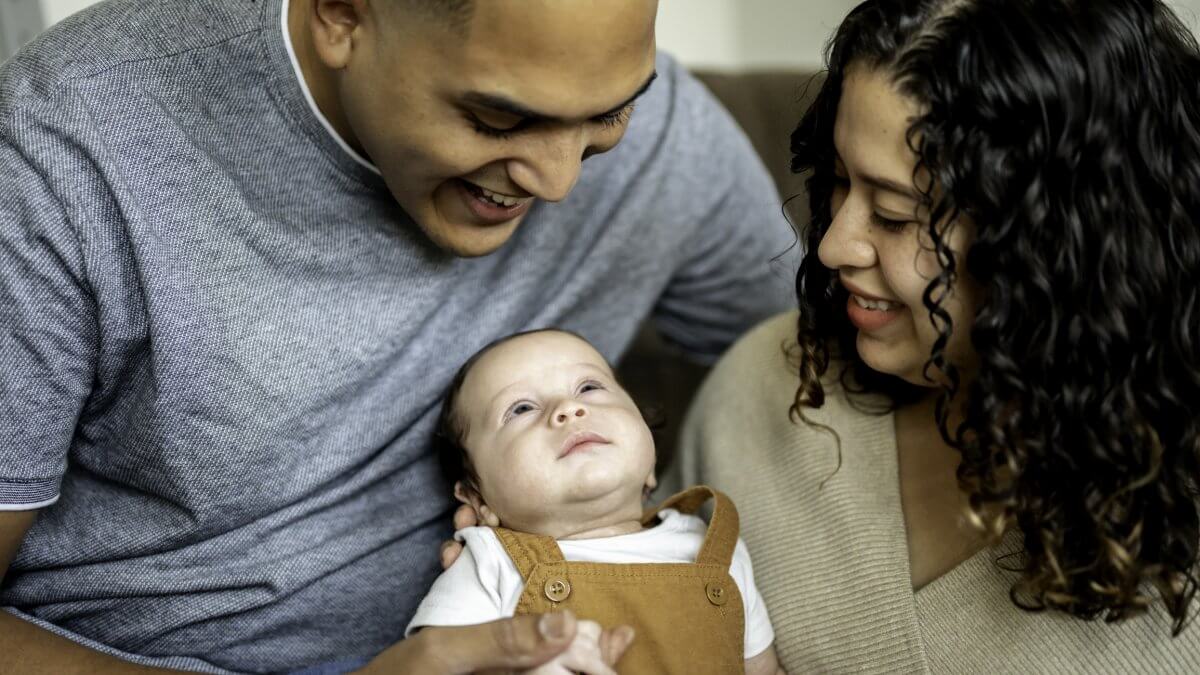The two week wait (TWW) after an embryo transfer is the critical period when surrogates and intended parents await pregnancy confirmation.
Focusing on your physical and emotional well-being can help these next two weeks will fly by.
Keep reading to learn how to increase your implantation chances, and navigate the next two weeks physically and emotionally.
The two-week wait can feel overwhelming, but you don’t have to go through it alone. Reach out today and let’s talk about how we can support you through this phase of your surrogacy journey.
What is the Two Week Wait?
The two week wait refers to waiting two weeks after embryo transfer before testing for pregnancy.
Pregnancy tests look for a hormone called human chorionic gonadotropin, or HCG. Your body always has a small amount of HCG, but on a successful implantation, production of the hormone ramps up.
It takes between two and three weeks for HCG to build up enough to detect a pregnancy. This means if you take the test too soon, it won’t be able to make an accurate determination, and will likely read as negative.
For the most accurate results, wait between 14 and 16 days before testing.
Two Week Wait Symptoms
Some women experience many early pregnancy symptoms and some don’t experience any at all. Early pregnancy symptoms can present as very similar to premenstrual symptoms.
This means, whether you have symptoms or not isn’t necessarily predictive of pregnancy.
Some of the more common two week wait symptoms include:
- Cramping. Mild uterine cramping can be expected early on after implantation.
- Fatigue. It’s thought that the rapid hormone production is partially responsible for the common feelings of tiredness that occur throughout the first trimester.
- Increased urination. During pregnancy your body has much more blood than usual, which causes your kidneys to produce more urine.
- Irritability. The influx of strong new hormones can cause mood swings and extreme emotions.
- Light spotting. This may be one of your first signs of pregnancy. Implantation causes some minor bleeding as embryos attach to the lining of your uterus. This usually happens between 10 and 14 days after implantation.
If you have any questions or concerns about symptoms during the two-week wait, contact your physician immediately.
Learn more about what symptoms and side-effects you may experience during the two week wait by reading our article about what to expect after the embryo transfer.
When to See a Doctor
Severe symptoms should be taken seriously. If you experience any of these, contact your doctor and seek medical attention immediately.
- Heavy bleeding
- Severe pain
- Fever
How to Support Implantation in the Two Week Wait
There are plenty of ways during the two week wait to help embryos implant. The most important thing during this period is taking care of yourself.
Be intentional about your self-care, and pay attention to your mood, your stress levels and your physical symptoms.
Remember, you’re not alone. Your intended parents are on this journey right alongside you, and are likely experiencing much of the same anxiety and anticipation as you are.
Relying on and communicating with each other through this time can lead to an enduring and greatly fulfilling support system.
What to Do During the Two Week Wait:
- Rest and relax: Rest allows your body to conserve energy and focus on nurturing the embryo during the critical implantation period.
- Stay hydrated: Staying hydrated supports healthy blood circulation and hormonal balance.
- Eat a balanced diet: A nutrient-rich diet can help your body create a healthy environment for embryo implantation. Focus on whole, unprocessed foods like fruits, vegetables, whole grains, lean proteins and healthy fats.
- Take prenatal vitamins: Prenatal vitamins contain essential nutrients that help support implantation. Continue taking prenatal vitamins as prescribed by your healthcare provider.
- Practice gentle movement: Gentle physical activity increases blood flow to the reproductive organs, which can help facilitate implantation. With your doctor’s approval, engage in low-impact activities like walking, swimming or yoga.
- Avoid stressors: Stress hormones can disrupt your body’s hormonal balance and interfere with the implantation process.
- Stay in touch with your doctor: Keep your doctor informed about any unusual symptoms or changes you experience during this time.
What to Avoid During the Two Week Wait
- Overexert yourself: Intense physical activity can elevate cortisol levels, which might disrupt hormone balance. Avoid strenuous workouts, heavy lifting or any activity that puts undue pressure on your body.
- Overanalyze symptoms: Obsessing over symptoms can increase anxiety and lead to unnecessary stress. Instead, trust the process and give your body the time it needs to adjust.
- Test too early: Pregnancy tests rely on the hormone HCG, which may not be detectable until about 14 days after the embryo transfer. Avoid taking pregnancy tests early on in the two week wait.
- Isolating: The emotional stress of the two week wait can feel overwhelming. Reach out to your support system, including your intended parents, friends or a counselor if you need additional emotional support.
- Smoking: Avoid smoking and recreational drugs. Certain substances or lifestyle choices can interfere with the success of embryo implantation.
Foods and Drinks to Avoid During the Two-Week Wait
- Caffeine: Caffeine can constrict blood vessels, potentially affecting the uterine lining and implantation success. Excessive caffeine can also lead to dehydration. Avoid coffee, black tea, energy drinks and sodas that contain caffeine.
- Alcohol: Alcohol is linked to an increased risk of miscarriage, failed implantation and developmental issues.
- Unpasteurized dairy: Unpasteurized dairy products, like certain cheeses, milk and yogurt, carry a risk of bacterial infection (such as Listeria), which can negatively impact implantation and pregnancy.
- Processed or junk foods: Highly processed foods are often high in sugars and additives that can disrupt hormones necessary for implantation. Avoid fast food, packaged snacks, sugary drinks and foods high in trans fats.
How to Involve Your Intended Parents During the Two Week Wait
The two-week wait is a unique and emotionally charged time for both surrogates and intended parents. Involving your intended parents in the process can help strengthen your bond and provide mutual support.
Have questions about how to support your intended parents? Reach out to us for guidance today.
Here are some ways to keep them engaged and informed while maintaining emotional balance:
1. Share Milestones and Updates
While waiting, keep your intended parents updated on any milestones, no matter how small.
Whether it’s a positive feeling you’re experiencing or a health update, involving them in the journey can help them feel connected and reduce their anxiety.
2. Keep Them in the Loop with Symptom Tracking
Consider sharing your symptoms and how you’re feeling physically. If you’re experiencing fatigue, cramping or mood changes, let your intended parents know.
This involvement can help them feel a part of the process while also providing them reassurance.
3. Encourage Positive Communication
Encourage your intended parents to reach out, even if it’s just a quick message of support. Regular check-ins, even if brief, can help you feel supported while also easing their anticipation.
Sharing positive thoughts, encouragement and excitement can create a hopeful atmosphere.
4. Reassure Them with Your Self-Care
Let your intended parents know that you’re taking great care of yourself. Share the steps you’re taking to relax, de-stress, and stay healthy, whether it’s yoga, walks or extra sleep.
This can help ease their worries, knowing that you’re physically and emotionally prepared for whatever comes next.
5. Ask for Their Support When You Need It
If you’re feeling anxious or uncertain, it’s okay to lean on your intended parents for emotional support. Even if they can’t take away the uncertainty, their words of encouragement can make a big difference.
Sharing your vulnerability can strengthen the trust and connection between you.
Coping During the Two-week Wait for Surrogacy
This can be a challenging wait, so remember to be gentle with yourself. While you wait, try to stay positive, practice self-care, reach out to your community and find ways to stay busy.
- Maintain a routine: A predictable daily routine can provide structure, reduce anxiety and gives you a sense of control during a time when much feels uncertain.
- Limit online searches: The temptation to research every possible symptom or read about others’ experiences is high, but this can lead to unnecessary stress or confusion. Set limits on how often you check online forums or search symptoms.
- Lean on your community: Reach out to your family, friends and other connections you value. Surrounding yourself with caring, compassionate voices during this critical time can be uplifting.
- Stay busy: Keeping your mind occupied can prevent overthinking and make the time pass more quickly. Pass the time with books, TV, crafts, talks with friends, exercise or whatever makes you happy.
- Be prepared for the possibility of any outcome: Keeping an open mind and setting realistic expectations can reduce the emotional blow if the outcome is not what you hoped for. Talk with your partner about what you would both do if the test is positive or negative.
Two Week Wait FAQ:
Can you Exercise during the Two Week Wait?
Yes, generally you can exercise during the two week wait, but try to keep to low-impact activities and avoid strenuous exercise. Talk with your physician for personalized direction.
Can you Use a Hot Tub during Two Week Wait?
No, avoid entering a hot tub during this time period.
Can you do Hot Yoga during Two Week Wait?
No. Hot yoga is considered strenuous exercise. Light aerobic activity (like yoga at a regular temperature) is a better option for surrogates.
Can you fly during Two Week Wait?
Yes, flying will not affect your chances of implantation.
Can you swim during the Two Week Wait?
Yes. Generally swimming is not advised against. Talk with your physician for personalized direction.
Can you Drink Coffee during the Two Week Wait?
No. It’s thought that caffeine causes blood vessels in the uterus to constrict, which will negatively impact your chances of implantation. Avoid all forms of caffeine, including coffee, decaf coffee, dark sodas, black tea and decaf tea.
Can you Eat Sushi during the Two Week Wait?
No. Raw food carries a heightened risk of causing infection or food poisoning, which will negatively impact your chances of implantation. Avoid any food that contains raw meat or eggs, like sushi, torisashi, steak tartare, eggnog, cookie dough and other similar foods.
Can you drink during the Two Week Wait?
No. Drinking alcohol is not advised during this wait or at any point during gestation. Alcohol use in early pregnancy or even pre-pregnancy is linked to miscarriages and failed implantations.
Can you have Sex during Two Week Wait?
No. While sex may not have negative effects during this time for naturally conceiving couples, it’s generally advised against after an embryo transfer. It could also go against the terms of your surrogacy contract. Check with your physician and your surrogacy coordinator.
Can you take Advil during the Two Week Wait?
No. Anti-inflammatory medication like ibuprofen (the primary active medication in Advil) changes your blood pressure. Usually, this change is small enough to not cause problems; however, there are some studies that link ibuprofen and its side effects to early-pregnancy miscarriage.
Can you take Antibiotics during the Two Week Wait?
Yes. Antibiotics will not affect your chances of implantation.
Can you take Benadryl during the Two Week Wait?
Yes. Benadryl is safe to use during the two week wait, however, it becomes unsafe later in pregnancy. Talk with your physician for personalized direction.
Surrogacy Support
Your two week wait is a delicate time, full of anticipation, but we believe you can make it through. Wherever you are in the process, we’ll be here with you every step of the way.
Are you ready to begin your surrogacy
journey? We’re here to provide support, from the two-week
wait to your delivery day. Contact
us today.









